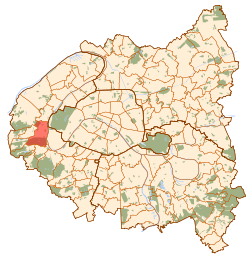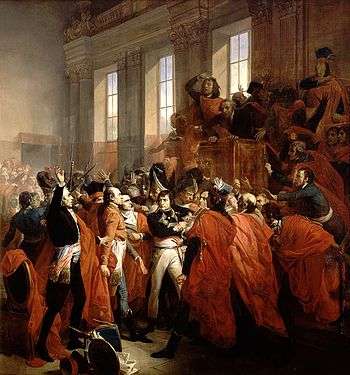Saint-Cloud
| Saint-Cloud | |
|---|---|
|
Saint-Cloud above the Seine | |
 Paris and inner ring départements | |
| Coordinates: 48°50′N 2°13′E / 48.84°N 2.22°ECoordinates: 48°50′N 2°13′E / 48.84°N 2.22°E | |
| Country | France |
| Region | Île-de-France |
| Department | Hauts-de-Seine |
| Arrondissement | Boulogne-Billancourt |
| Canton | Saint-Cloud |
| Intercommunality | Cœur de Seine |
| Government | |
| • Mayor (2005–2008) | Éric Berdoati |
| Area1 | 7.56 km2 (2.92 sq mi) |
| Population (2006)2 | 29,981 |
| • Density | 4,000/km2 (10,000/sq mi) |
| Time zone | CET (UTC+1) |
| • Summer (DST) | CEST (UTC+2) |
| INSEE/Postal code | 92064 / 92210 |
|
1 French Land Register data, which excludes lakes, ponds, glaciers > 1 km² (0.386 sq mi or 247 acres) and river estuaries. 2 Population without double counting: residents of multiple communes (e.g., students and military personnel) only counted once. | |
Saint-Cloud (French pronunciation: [sɛ̃ klu]) is a commune in the western suburbs of Paris, France. It is located 9.6 kilometres (6.0 miles) from the centre of Paris. Like other communes of the Hauts-de-Seine such as Marnes-la-Coquette, Neuilly-sur-Seine or Vaucresson, Saint-Cloud is one of the wealthiest cities in France, ranked 2nd in average household income among communities with 10- to 50-thousand tax households.[1]
History
The town is named after Clodoald, grandson of Clovis, who is supposed to have sought refuge in a hamlet on the Seine near Paris, then named Novigentum, like many other newly founded mercantile settlements outside the traditional towns. Canonized after his death, the village where his tomb was located took the name of Sanctus Clodoaldus.
A park contains the ruins of the Château de Saint-Cloud, built in 1572 and destroyed by fire in 1870, during the Franco-Prussian War. The château was the residence of several French rulers and served as the main country residence of the cadet Orléans line prior to the French Revolution. The palace was also the site of the coup d'état led by Napoleon Bonaparte that overthrew the French Directory in 1799.
The town is also famous for the Saint-Cloud porcelain produced there from 1693 to 1766.[2]
The Headquarters of the International Criminal Police Organization (Interpol) had been located at 22 Rue Armengaud from 1966 until 1989, when it moved to Lyon.
Main sights
The main landmarks are the park of the demolished Château de Saint-Cloud and the Pavillon de Breteuil. The Saint-Cloud Racecourse, a race track for Thoroughbred flat racing, was built by Edmond Blanc in 1901 and is host to a number of important races including the annual Grand Prix de Saint-Cloud.
Transport
Saint-Cloud is served by two stations on the Transilien La Défense and Transilien Paris – Saint-Lazare suburban rail lines: Le Val d'Or and Saint-Cloud.
The town is also served by a number of stops on the T2 Tramway, which runs along the side of the Seine.
Central Saint-Cloud, known as le village, is also served by the metro station 'Boulogne-Pont de Saint-Cloud' (line 10), located across the Seine river on the Boulogne-Billancourt side of the Pont de Saint Cloud.
Education
Public high schools:
- Lycée Alexandre-Dumas
- Lycée Santos-Dumont
It is also served by the public high school Lycée Jean Pierre Vernant in Sèvres.[3]
Private high schools:
- Institution Saint-Pie-X
International schools:
- American School of Paris
- Internationale Deutsche Schule Paris (German school)[4]
Personalities
Notable births
- Philippe II, Duke of Orléans (1674–1723), Regent of France from 1715 to 1723
- Élisabeth Charlotte d'Orléans (1676–1744) Regent of Lorraine,lived at the Palace at Saint-Cloud
- Louis Philippe II, Duke of Orléans (1747–1793), a key figure during the early stages of the French Revolution;
- Princess Marie Bonaparte (1882–1962), psychoanalyst, closely linked with Sigmund Freud
- Gilbert Norman (1914–1944), Special Operations Executive member
- Annick Gendron painter
- Nicole Courcel (1930–) film actress
- Jean-Claude Killy (born 1943), alpine skier and a triple Olympic champion
- Gérard Manset (born 1945), known as Manset, rock songwriter
- Hervé Guibert (1955–1991), writer
- Mino Cinelu (born 1957), musician
- Alexandra Fusai (born 1973), former professional tennis player
- Ingmar Lazar (born 1993), classical pianist, prodigy
Notable residents
- Henri III of France (1551–1589) – King of France, assassinated in Saint-Cloud
- Philippe d'Orléans (1640–1701) – lived in the Château de Saint-Cloud from 1658 to his death in 1701
- Henrietta of England (1644–1670) – lived and died in the château de Saint-Cloud.
- Napoléon Ier (1769–1821) – lived in the Château de Saint-Cloud
- Antoine Sénard (1800–1885) – member of the National Assembly, mayor of Saint-Cloud from 1871 to 1874
- Émile Verhaeren (1855–1916) – Flemish poet
- André Chevrillon (1864–1957) – French author
- Florent Schmitt (1870–1958) – French composer
- Maurice Ravel (1875–1937) – French composer
- Marcel Dassault (1892–1986) – French businessman and politician
- Lino Ventura (1919–1987) – Italian actor, lived and died in Saint-Cloud
- Jean-Pierre Fourcade (born 1929) – French Minister, mayor of Saint-Cloud from 1971 to 1992
- Gérard Holtz (born1946), French sports journalist
- Michel Platini (° 1955), French football player
- Jean-Marie Le Pen, French politician, owner of Domaine de Montretout in Saint-Cloud.[5]
Notable burials
- Edmond Blanc (1856–1920)
- René Alexandre (1885–1946)
- Maurice Bessy (1910–1993)
- Gérard Blain (1930–2000)
- Gilbert Grandval (1904–1981)
- Fernand Gravey (1905–1970)
- Jean-René Huguenin (1936–1962)
- Dorothy Jordan (1761–1816)
- Vlado Perlemuter (1904–2002)
- Andrée Servilange (1911–2001)
- Jean Toulout (1887–1962)
- Maurice Yvain (1891–1965)
Twin towns
Saint-Cloud is twinned with:
 – Frascati, Italy
– Frascati, Italy – Bad Godesberg, Germany
– Bad Godesberg, Germany.svg.png) – Kortrijk, Belgium
– Kortrijk, Belgium – Maidenhead, United Kingdom[6]
– Maidenhead, United Kingdom[6]
See also
References
- ↑
- ↑ J. Paul Getty Museum. "Saint-Cloud Porcelain Manufactory". Retrieved 2008-01-13.
- ↑ Home page. Lycée Jean Pierre Vernant. Retrieved on September 7, 2016. [...]qui relèvent de la zone de desserte du lycée ( communes de Sèvres, Ville d’Avray, Chaville, Saint -Cloud) [...]
- ↑ "Get in contact." Internationale Deutsche Schule Paris. Retrieved on 23 January 2015. "Postanschrift: 18 rue Pasteur F – 92210 SAINT CLOUD Besucheradresse: 12 rue Lelégard F – 92210 SAINT-CLOUD"
- ↑ "Marine Le Pen, une riche propriétaire (comme son père)". Le Nouvel Observateur. January 27, 2016. Retrieved October 7, 2016.
- ↑ "British towns twinned with French towns [via WaybackMachine.com]". Archant Community Media Ltd. Archived from the original on 5 July 2013. Retrieved 2013-07-20.
External links
| Wikimedia Commons has media related to Saint-Cloud. |
 "St Cloud, a town of northern France". Encyclopædia Britannica (11th ed.). 1911.
"St Cloud, a town of northern France". Encyclopædia Britannica (11th ed.). 1911.

